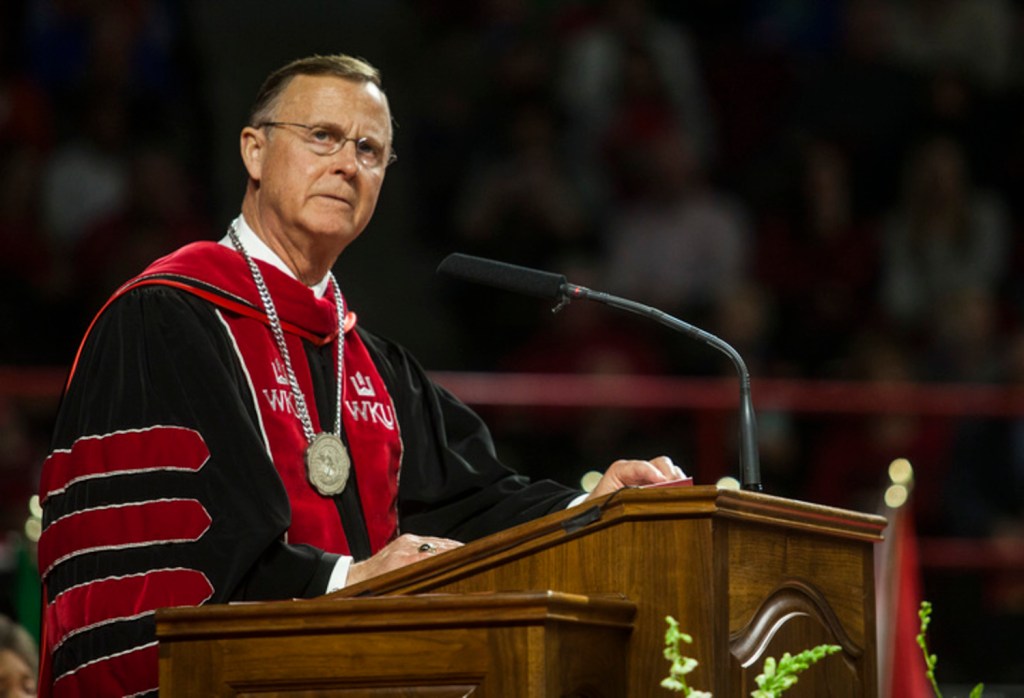Ransdell to tackle WKU priorities
Published 7:22 am Thursday, January 12, 2017

- President Gary Ransdell speaks during commencement on Saturday, Dec. 10, 2016, at E.A. Diddle Arena. (Austin Anthony / photo@bgdailynews.com)
With less than six months left in office, Western Kentucky University President Gary Ransdell isn’t wasting any time.
Before retiring June 30, he’ll tackle next year’s budget, retention challenges, campus construction projects and other loose ends. He’ll also do that while facing the emotional aspects of leaving his 20-year commitment at WKU.
“It’ll be emotional,” Ransdell said Wednesday in a wide-ranging interview. “I’ve got to be able to mix that with staying focused on the work that needs to be done over the next few months. For 20 years, this job’s had a lot of emotional ups and downs, and the next six months will be no different.”
Ransdell sees his legacy as “higher academic quality, relevant degree programs at the undergraduate and graduate level, a rebuilt campus, a stronger endowment and private support and an internationally and racial diverse campus.”
But challenges remain. Among them is overseeing next year’s budget and prioritizing retention reform.
“What we’re doing just is not sufficient,” he said. “We must improve our persistence rates and the degree to which our students persist and graduate. Changes have to be made. I’ll be focused on that this spring.”
Ransdell is also prioritizing a new dining contract that includes the renovation of the Garrett Conference Center. That decision will be announced soon, he said.
A controversial on-campus sports medicine complex also remains up in the air, and Ransdell said the campus is exploring other options for it.
He described the delay as “a major disappointment that tensions in our medical community prevented that important facility … we should be underway with it by now.”
“It bothers me that the best interest of WKU was bypassed in that whole process,” he said.
Ransdell is “delighted by the passage of recent state legislation repealing the prevailing wage, which previously often meant higher wages for workers on publicly-funded projects than those in the private sector. He said prevailing wage has cost WKU $108 million since he became president and the new law will save WKU $33 million on projects in the works.
While Ransdell sets to work, a Presidential Search Committee under WKU’s Board of Regents is searching for his replacement. The committee, made mostly of regents, recently met in Nashville to interview four remaining candidates for the job. At this point, the candidates’ names haven’t been revealed publicly. The plan is to name the next president by early March or sooner.
The board has maintained confidentiality in an attempt to protect candidates from career risk, but critics on campus are questioning whether that’s in WKU’s best interest.
Ransdell hasn’t been involved in the search, but he said he understands the importance of keeping a tight lid on candidates’ identities given the pressures candidates face.
“These are important decisions and individuals have to be mindful of the high positions in which they currently serve and not undermining their current duties while they’re engaged in discussions with other institutions,” he said.
Ransdell said he has “some sense” of a couple finalists, hearing bits and pieces, but ultimately he’s “not familiar with the candidates.” When asked if he knows how many are women or people of color, Ransdell said he didn’t know. Ransdell said he’s kept his distance from the search and that the Board of Regents is handling the process “exceedingly well.”
Before Ransdell was hired in 1997, he went through a public finalist process that included a campus visit. When asked if that was beneficial to him, Ransdell said it was more helpful to the board and to the campus.
“I think the board wanted to see how its finalists handled themselves with various campus groups,” he said, adding that four finalists were involved.
But Ransdell also stressed that times have changed and his situation was unique being that WKU is his alma mater.
“It was just a different era and boards are under different pressures these days,” he said.
Ransdell had been at Clemson University for 11 years at the time, and he said it was no surprise when the job opened at WKU that he would be a candidate.
“I didn’t risk my vice presidency at Clemson by being a public candidate here,” he said.
Ransdell said if other institutions were involved and he went through the same public process two or three times, “then I could have undermined my effectiveness at Clemson.”
“I would’ve demanded confidentiality had it been different dynamics,” he said. “And if an institution couldn’t have given me confidentiality I would have withdrawn.”
Regardless of who becomes WKU’s next leader, Ransdell and his wife, Julie, are determined to leave on a strong note.
“We will hand over to the next president a proud university with a strong national and international reputation and a unique spirit,” he said.
— Follow education reporter Aaron Mudd on Twitter @BGDN_edbeat or visit bgdailynews.com.





